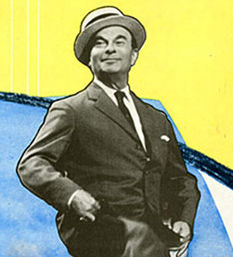 Named for the holiday on which he was born, Pesach Burstein began life in Warsaw, Poland. And like the Israelites leaving Egypt, he was destined to wander. His family moved to Russia and by the age of 10, he was working at a local circus. Five years later, he left home to travel with a Yiddish entertainment troupe and never saw his parents again.
Named for the holiday on which he was born, Pesach Burstein began life in Warsaw, Poland. And like the Israelites leaving Egypt, he was destined to wander. His family moved to Russia and by the age of 10, he was working at a local circus. Five years later, he left home to travel with a Yiddish entertainment troupe and never saw his parents again.
Although he was arrested by the Russians as a spy during World War I, he managed to escape to become a wandering minstrel who traveled from country to country bringing song and laughter wherever he went. He was enormously successful as the writer, director, and star of the show A Khasene in Shtetl (A Village Wedding). In 1923, he was discovered by the great Yiddish actor and impresario Boris Thomashevsky. Soon he was singing and dancing and bird-whistling on Broadway. A renowned whistler, Pesach was sometimes compared to Al Jolson. He recorded many songs for Columbia Records during the 20s and 30s including Odessa Mama and a Yiddish version of Sonny Boy.
Burstein continued to travel worldwide starring in Yiddish operettas. But it was on one of his trips back to New York City that he met actress Lillian Lux, who first became his stage partner, and then his wife. After their wedding in South America, the young couple took off for an acting tour in Europe. But times were darkening for the Jews and the couple was fortunate to be able to escape on the last boat out of Poland in 1939.
The couple entertained in the Catskills, once even sharing the stage with Jerry Lewis. In 1943, they opened their own theater, The Hopkinson, in Brooklyn, New York. Their twins (Mike and Susan) were born in 1945, and by 1952 the whole family was touring around the world as The Four Bursteins.
Pesach Burstein appeared in two award-winning Israeli films, Salach Shabati starring Topol in 1964 and Schnei Kuni Lemel, starring his son Mike in 1966.
In his later years he worked on writing his memoirs with his wife. Geshpilt a Lebn (Life Upon the Yiddish Stage) was published in 1980, just six years before his death.
In 2003 the English translation, “What A Life!” edited by Gershon Freidlin, was published by Syracuse University Press. The publisher had this to say about the book: “Pesach Burstein . . . recalls dramas both onstage and off in this memoir, which he dictated to his wife, Lillian Lux Burstein. The story of Burstein's successful stage career is played out against the background of political turmoil in Europe, vignettes of life in small towns and big cities, friendships and rivalries among theater folk, family life, emigration to the United States, and tours through Europe, South America, Israel, and South Africa. Every personal anecdote tells the larger history: theater history and also the history of the Yiddish communities who were his audiences.”
Music in this collection courtesy of Mike Burstyn






















































